In a disaster, vehicles and power generators are the two most important engines you might need, and having enough diesel to run them will be crucial.
The question remains, how should you store diesel? You can’t really just go to the gas station, fill up a few barrels, and keep them in the basement.
So, is storing diesel fuel in plastic containers even a viable option, and how long does diesel last in plastic containers?
That’s what we’re going to find out today.
Can Diesel Be Stored in Plastic Containers?
Yes, you can store diesel fuel in plastic containers, but only for a limited amount of time.
Most plastic containers are made from Polyethylene, which will react with diesel after a while. This causes the plastic to break down and mix with the diesel. When this happens, the diesel becomes unusable, and it’s best to throw it away.
You can store diesel in plastic containers for about six months. Anything longer than that will compromise the quality of the fuel.
Thus plastic containers are a good short-term but a bad long-term option for storing diesel. Let’s go over some of the best types of plastic containers for storing diesel.
Plastic Drums
Most plastic containers are made from polyethylene, but there’s also a form of plastic called high-density polyethylene, or HDPE for short. Industrial-grade plastic drums are usually made from HDPE. This makes them last longer than your run-of-the-mill plastic container.
However, even high-density plastic is going to break down under the influence of diesel, albeit more slowly than regular plastic.
Some retailers will try to convince you that HDPE containers can store diesel for a long time. This is absolutely untrue. Your diesel will become unusable after about six months.
It’s possible that it’ll last a little bit longer than it would with regular plastic containers, especially if you store it under the right conditions, but this still isn’t a long-term option.
However, if you only need to store diesel for about five to six months, plastic drums are actually a better option than metal drums.
First of all, they’re generally cheaper than metal containers, so they’ll pay off easily in the short-term.
Second, plastic drums don’t rust, so you don’t have to worry about your diesel being contaminated.
Third, since there are no metal alloys used in plastic containers, you don’t have to worry about a bad reaction to metal. For example, diesel starts to deteriorate under the influence of zinc and copper, which is what some metal tanks contain.
Finally, plastic containers are easy to patch up if you make a hole, and since they’re cheap, they’re easy to replace!
IBC Tanks
Just like plastic containers and drums, IBC tanks can be used for short-term but not long-term storage. Intermediate bulk containers, known as IBC tanks, are often used to transport diesel and other types of fuel. They’re made from HDPE and they don’t break down easily.
However, they’re not supposed to be used for long-term storage. They’re safe to use for transport because it usually doesn’t take more than six months.
Gas and oil companies traditionally use metal IBC tanks for long-term storage of diesel fuels. These tanks are made from stainless steel and they’re specifically designed to store fuel without losing quality!
If you need to store massive amounts of diesel fuel for a short period, then IBC tanks are a great choice. Some of these tanks have a 550-gallon capacity, so they can handle big loads.
They’re not recommended for long-term storage, though, and they’re usually much more expensive than drums and containers.
Jerry Cans
Jerry cans (also known as jerrycans, depending on who you ask) were once made from pressed steel. Nowadays, most of them are made from…you guessed it — HDPE!
This means they aren’t a good long-term storage option.
Does that make old steel jerry cans safe for diesel storage? Absolutely not!
If you do find a steel jerry can, it’s most likely more than 50 years old. I would not trust a 50-year-old metal container not to rust.
Cheap jerry cans are good as a short-term storage option, but what they really excel in is transport. These cans were designed to perfectly stack on one another, so you can transport a dozen jerry cans in the trunk of your car with ease.
However, remember how I said “most of them” are made from HDPE? I may have some good news for you.
There are a few manufacturers of high-quality jerry cans that can store diesel for the long term under the right conditions.
These jerry cans were made specifically for storing diesel. Diesel-resistant internal paint is used to prevent rusting, while they also employ an anti-spill system. The optimal stacking design is the same one used by WWII armies.
Your diesel fuel will last longer than six months if you store it in these cans and under the right conditions.
Diesel Storage Containers
That’s a lot of information to take in, so here’s a simplified table!
| Type of Container | Diesel Longevity | Ideal For |
|---|---|---|
| Plastic containers | 6 months* | Short-term storage of small amounts of diesel |
| Plastic drums | 6 months* | Short-term storage of large amounts of diesel |
| IBC tanks | 6 months* | Short-term storage of massive amounts of diesel |
| Jerry cans | 6–24 months** | Long-term storage of small amounts of diesel |
| Metal tanks and drums | 6–24 months** | Long-term storage of large amounts of diesel |
*Possibly a few months more under favorable conditions
**Depending on storage conditions
Ultimately, regardless of the type of container you store it in, diesel is unlikely to last more than two years.
How to Store Diesel Fuel
The biggest enemies of diesel are moisture, microorganisms, and oxidation. All three will lead to degradation, but they’re all manageable problems.
Avoid Moisture and Microorganisms
Condensation creates moisture, and moisture creates a great environment for bacteria and fungi, which you can see as a layer of sediment. These organisms start the process of natural degradation, destroying your fuel. Experts suggest treating your diesel with biocides twice a year to prevent this from happening.
Hydrolysis is another reason moisture is bad for diesel. Mixing diesel with water results in hydrolysis, which is just a fancy word for the breakdown of molecules under the influence of water.
If moisture accumulates in the container, it will not only allow the development of microorganisms, but it will start to break down the diesel on its own.
A similar process happens when diesel starts reacting to plastic — the easiest way to avoid that is to store it in metal, preferably stainless steel containers.
Another good tip is to keep your diesel at a low temperature, preferably below 70°F. Bacteria and fungi develop much slower at lower temperatures.
Avoid Oxidation
Finally, we have the threat of oxidation. There’s no way to avoid oxidation since diesel will come into contact with oxygen as soon as it’s made in the refinery. But you can slow down oxidation by keeping the container at a low temperature. Ideally, 20°F, but the aforementioned 70°F temperature will also suffice.
Adding antioxidants to the diesel will help keep the quality.
The ultimate solution for storing diesel for the long term is an underground storage tank. They’re safe, water-free, and underground temperatures are lower.
However, underground tanks are also big, difficult to install, and expensive, so they’re not an option for most people.
Additional Tips
Besides avoiding moisture, microorganisms, and oxidation, here are a few additional things to keep in mind:
- Diesel is highly flammable, so keep it away from heat sources.
- Since it’s a fire hazard, you shouldn’t store it near your home.
- No smoking within 100 feet of the storage area.
- Keep the container(s) on a small platform above the ground.









